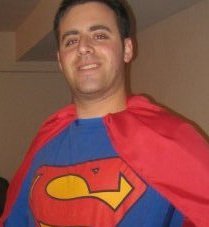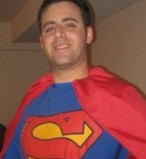
It’s a bird; it’s a plane, it’s Michael Schaffer for this week’s coffee talk. This non-coffee drinker (gasp) was a former DJ that uses music to “pump up the volume” for his day. He’s a savy PR/ Social Media professional working in the entertainment/sports world as social media director for Brotman-Winter-Fried Communications. To get through his crazy days Mike turns to songs from Glee, the Cupid Shuffle, Ingraham Hill and the Beastie Boys for motivation. Not one to name drop, he did admit to losing his cool when he met Jaleel White, who played Steve Urkel. Also be sure to check out Mike’s blog: The Buzz.
And so I give you, Mike Schaffer, shedding light on the sports and entertainment world of PR.
What past experiences put you on the path to working in entertainment?
In high school I was editor in chief of the newspaper, and in college I was sports director and station manager of the radio station. I interned at a TV station one summer, also. I knew that being in the media wasn’t for me, but I wanted to work WITH the media, which led me into PR. I majored in Sports Information and Communication (later renamed Sports Media). In college, I interned with Brotman-Winter-Fried Communications in Washington, DC, and they hired me after I graduated in May 2004. While I was attracted to the football, golf, tennis and boxing projects, the SPECTACLE projects became really enticing. Sports and entertainment PR are virtually the same thing so its been fun to crossover between the two.
Tell me your likes and dislikes of entertainment PR.
I love the show. There is nothing like an electric crowd ready to have a good time. I’ve also really enjoyed the people I’ve had the opportunity to work with, like Muhammad Ali, John Legend and Cal Ripken, Jr. (I’m not a name-dropper, I swear!)
On the downside, we work while people work and while people play. There are a lot of night and weekend hours. Creating a balance with work, family and friends is critical. As far other downsides, I can’t think of anything too major.
How do you stay ethical while working in entertainment PR?
Ethics are a real interesting topic. I find that it’s impossible to judge someone else’s morals, since the way we act is the result of our life experiences to date. I’ve had the pleasure of working with some incredible people at all levels. Like in any walk of life, there are people in the industry that I don’t agree with their values, but that’s OK. If I keep my moral compass in the right direction for me, I can sleep soundly at night.
What was the transition like from Senior Account Executive to Director of Social Media?
The transition into director of social media has been a fun ride. In my previous role, I worked on probably a dozen or so accounts, but now I am involved in nearly every account our agency has, not to mention creating plans for new business proposals. I enjoy working with more clients in a direct fashion. I’ve been busy starting a blog for the company while increasing our clients’ social media presence. It takes a lot of start-up work to get each client on-board with a social media lifestyle. To maximize their exposure, it has to be a commitment, not just a campaign.
Tell me more about getting a new client on-board with social media.
I see social media as a two-part system. First, you must have content. If there is no reason for people to follow a brand online, well, nobody is going to follow it! Second, you must have the connections. That means you have to tell people that you are online and have content they want. For example, one of my clients is the National Museum of Crime & Punishment. To bolster their presence, we offered exclusive discounts to Twitter followers. We also linked their account to major DC accounts, like news organizations and other folks with large followings. I’ve noticed much more chatter about the museum online.
What challenges do you face when explaining a social media campaign to possible new business?
I think business owners are more tech-savvy than ever right now, in general. There are many people out there, though, that think social media is just teenagers talking about nothing. So we try to show them that social media is an outlet they control entirely, like advertising, but doesn’t yet have the “meh, they paid for that message” stigma. In many regards, it can be the best of both worlds.
You’ve taken the initiative to build a community with #sportsprchat. How did it all start?
I’ve had the pleasure of contributing to #PRStudChat, #u30pro and other terrific online chats over the past several months. Looking around the Twittersphere, I also saw some really smart people discussing sports. Being a social media guy and sports professional, it hit me one day that there was a huge opportunity to bring together, and maybe even create, a Sports PR community online.
Recently #prbc debated the pros and cons of text message marketing. Do you have any experience with this?
I have some experience with this and feel that much like any other form of marketing, “social” or “traditional,” it takes time and effort to succeed. In reality, it takes more, since there is usually a cost associated with being a part of a text community. We used a text campaign for a mixed martial arts event. The hardest part was communicating that it was available. We went to dozens of bars and clubs trying to get people to sign up. At the end of the day, we had a few hundred, but it really didn’t justify the time or expense we put into it. For a national brand with advertising budget, I think it can be very successful. I mean, look at American Idol, which has turned texting into a cultural touchstone! The desire is there, but the motivation to act on it comes from the marketers.
You recently included tweets from customers in a press release for your client, California Tortilla (@caltort). This is definetely a new tactic. How did it fit their brand?
California Tortilla is already ahead of the curve in social media. They had an email newsletter when other quick-casual restaurant chains barely had computers. Their have a Taco Talk newsletter, Facebook, and Twitter accounts that created a huge online community. If they’re releasing news, the online community gets it first. In a release we sent out last week about their new Bacon Chicken Club Burrito, we included several Tweets from customers who were excited about the new item. We’re hoping that it will create some transparency between customers and media, who will see that people are really pumped for this option. If it works, it may be something we suggest to other clients, but I think it really must match the brand’s personality to do something like that.
I urge you to join our coffee talk and add to the questions/comments. If you have any additional questions/comments for Mike post them below and we’ll see if he can spare a few more minutes for some answers.
[recent posts]
